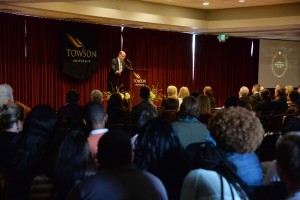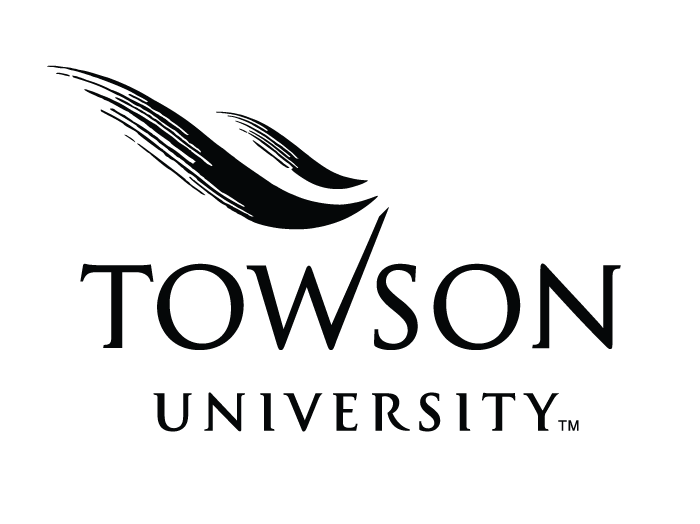“So what are you going to do after they pick a new president?” someone at the mic asked Interim President Timothy J. L. Chandler at Tuesday afternoon’s town hall meeting for faculty, staff and students.
There was a beat, maybe two, and some uncomfortable laughter from the crowd.
“I’m never speechless,” Chandler said.
The laughter got more comfortable.
The hundreds who gathered for the town hall style meeting appreciated a bit of humor from Chandler, even though the topics and concerns were on the serious side. The search for a new president is just one of the transitions taking place in the next few months for Towson University.
“It needs to be done openly, it needs to be done honestly, it needs to be done absolutely transparently,” Chandler said of the search. He served as acting president beginning in August when former president Maravene Loeschke took a leave of absence for health and personal reasons, and he was named interim president when she retired for those reasons in December.
“I will be putting my name in, until you all tell me not to,” he quipped. The crowd immediately applauded before he finished the thought. “My wish is that we get the very best person for Towson. That’s what Towson needs, that’s what Towson deserves.
“Thank you for the question,” he deadpanned. “I think.”
The presidential search committee begins its work in early May, and Chandler expects their recommendation to be made within six months, after Chancellor-elect Robert Caret joins the University System of Maryland. Other transitions include six new incoming members of the USM Board of Regents and a new governor in Annapolis.
Annapolis provided the crux of the afternoon’s conversation, particularly about operating and capital budgets. Towson was able to retain $300,000 in operating funds that were threatened, but there is still a $3.5 million shortfall in the operating budget, requiring a continuing “soft freeze” on hiring, raises, and travel, as well as a 5 percent tuition increase for students.
“I hope it won’t put us out of reach in terms of affordability for many of our students,” Chandler said. “But we do want to maintain the quality of education that we’re able to offer here, and you can’t do that on a shoestring.”
In addition to the impact on students, the budget constraints mean challenges in COLA (cost-of-living adjustment) issues—still on track to be cut at the end of the fiscal year—as well as pay and hiring for staff and faculty. More than half the faculty are tenure track, teaching 60-70 percent of the classes, which Chandler said is much better than the national average of 32 percent tenure track faculty. Chandler said he wants to make sure there is stability, curricular innovation and articulation, and student opportunities to interact with faculty who work professionally in their fields.
Still, he said, teaching at Towson can be expensive for faculty who move from the Midwest or the South. To that end, he disclosed that he would like to consider faculty housing to ease that burden.
Though it was not discussed with state lawmakers this year, the interim president also said he wants to build even more residence halls than what are set to be online by summer 2016 so that more Towson students have the opportunity to live in campus. The university can currently house about 5,000 students—not enough, Chandler said, to encourage the right college experience and engagement for Towson students whose memories matter when they become alumni. He also said he is willing to consider Greek housing on campus.
Buildings, of course, usually require capital funding. In a few days, Chandler will talk with Governor Larry Hogan while he visits campus, making clear the university’s most immediate priorities, including the needed new buildings for the Jess and Mildred Fisher College of Science and Mathematics and for the College of Health Professions. Though STEM and health fields are seeing increasing professional demand in the state, the General Assembly again deferred planning funds for those buildings for the upcoming fiscal year.
“If he wants Maryland to be open for business,” Chandler said, referring to the governor’s common campaign theme, “then he probably needs a workforce to make sure that those businesses can work, and we supply a very large number of people for his workforce.”
The university’s physical plant is under evaluation in the new master plan, underway now. These plans are completed every five years, but their scope looks many years into the future.
“Our 150th year is a great time not just to look back on where we’ve been, but to think about what we need to look like 20 and 30 and 50 years from now,” Chandler said.
He sees the institution from a perspective of great pride for student accomplishments in every college, as well as athletics, which boasts the best student-athlete graduation rates of all Division I USM schools, and the best African-American student-athlete graduation rate of all Division I schools in the country.
“This weekend, we’ll celebrate the new softball stadium. I understand I’m not going to have to throw out a pitch,” Chandler said. “Thank goodness for that.”
Watch the full town hall meeting here.

